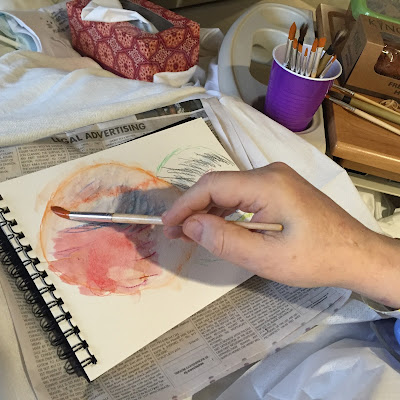 |
| Calvary (M.A. Reilly, 2013, South Dakota) |
"History," Stephen said, "is a nightmare from which I am trying to awaken." James Joyce, Ulysses
I.
I was walking down the street in a town where I do not live when I was stopped by a sign in a shop window.
Only Born Again, Evangelical Christians will know salvation.
No one else will enter Heaven.
What first caught my eye was the word, heaven, and I slowed thinking about Rob, who is dead nearly a year, and wondering what happens after death. I am only beginning to emerge from the shock of my husband's too-soon-death and am attracted to possible answers I do not have. And so I read the whole message and then thought about my husband who was kind and generous to others.
He was also Jewish. So, no heaven for him?
II.
He was also Jewish. So, no heaven for him?
II.
Evangelical Pastor Billy Graham would tell you that my husband is presently in hell.
He tells his faithful, "The hope of eternal life rests solely and exclusively upon your faith in Jesus Christ! Make no mistake about this...When Christians die, they go straight into the presence of Christ—to Heaven—to spend eternity with God. An unsaved sinner’s destiny is separation from God, a place that Jesus has called hell." (from here).
He tells his faithful, "The hope of eternal life rests solely and exclusively upon your faith in Jesus Christ! Make no mistake about this...When Christians die, they go straight into the presence of Christ—to Heaven—to spend eternity with God. An unsaved sinner’s destiny is separation from God, a place that Jesus has called hell." (from here).
Honestly, given this rhetoric, this sense of singular entitlement, is it any wonder that hate crimes against Muslims and Jews are soaring?
III.
In the 2016 U.S. election, 81% of white evangelicals voted for Trump. Further in a recent poll, "[m]ore than any other religious group, a strong majority of white evangelical Protestants hold a positive view of President Donald Trump...They are also the only religious group to to favor the temporary ban on immigrants from seven Muslim-majority countries" (from here).
Is that the christian evangelical way?
Refuse entry to the dying children of Syria (unless they happen to be Christians)?
Turn one's back as families are split apart?
Refuse entry to the dying children of Syria (unless they happen to be Christians)?
Turn one's back as families are split apart?
IV..
History teaches us that it is at best, worrisome, when organized religion and politics intermingle. In more extreme situations when God's voice is heard by only a select group--mass murder is often served alongside the "saved" who murder or remain mute. One only has to think of Ludwig Müller, the man Hitler appointed Bishop to the German Evangelical Church in 1933 to understand how 'good' Christians can do evil things and do so with righteousness that defies the foundations world religions are based upon.
Müller believed in Christ the Aryan and supported the "purification" of Christianity and the instruction of youth to pray to Jesus and Hitler. It was ordinary people, like those who prayed each Sunday in German Evangelical churches, who gave rise to the Third Reich. Those Protestant pastors who publicly objected were sent off to concentration camps.
Love thy neighbor was written out of the Aryan bible.
V.
For the last thirty years, here in the United States, a moral majority--the Christian right, has been flexing its muscles. Are these, like the German Evangelical Church, God's only chosen group? Is there no Christ in this brand of christianity?
According to Graham, evangelicals who are born again don't need to be good. They only need to confess their sins to God.
Graham says,
“There is no judgment, no Hell, for those who are in Christ...You can confess your sins, turn your back on your sins and receive Jesus Christ as your Savior now." (from here).
No judgment for earthly sins?
Nope.
None.
Friends, this is how evil gets normalized.











